Rosacea Medications
- Best Results8-16 weeks
- Treatment RecoveryNA
- Procedure TimeNA
- Skin SpecialistDermatologist
- Duration of ResultsVariable
- AnaestheticNA
- Back to WorkNA
- Cost$
Rosacea Medications
Prescription tablets are considered in severe cases of rosacea or if topical creams & lifestyle modifications are not effective. Tablets do not cure rosacea; however, they can be an effective way of temporarily suppressing skin inflammation. These groups of tablets are more effective for acne-rosacea or papular pustular disease. A treatment course ranges from 2 to 20 weeks.
FactsFacts on Tablets for Rosacea
- Primary aim of tablets is to reduce skin inflammation secondary to rosacea
- The most prescribed tablets include doxycycline, minocycline & erythromycin
- Dermatologists also prescribe low dose oral vitamin A
- Lifestyle changes, skin care & lasers can reduce the requirement for tablets
- Tablets are useful as part of rotational therapy during rosacea flare ups
- A course of tablets ranges from 2 weeks to several months
- Tablets can be synergistic with laser in reducing inflammation
What do tablets do Rosacea Medications?
The main role of tablets is to treat skin inflammation associated with rosacea. Many of these tablets are also classified as antibiotics, however, in the context of rosacea, they decrease inflammatory papules & pustules. Some tablets work by modifying the response of blood vessels that cause redness & flushing.
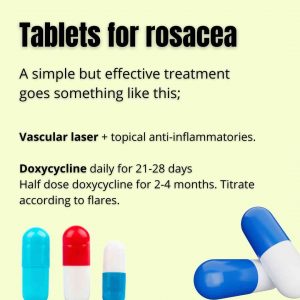
Why do dermatologists prescribe antibiotics for rosacea?
This group of medications are designed to treat skin inflammation & not a skin infection. (demodex infection responds to sulphur & ivermectin).
In many cases of rosacea, your skin is super inflamed & will not tolerate topicals, hence why they choose a systemic approach. Consider skin care & lifestyle changes prior to prescription tablets if you are naturally inclined to treat medical conditions.
What types of antibiotics & anti-inflammatories are prescribed?
The most frequent group are tetracyclines. They include doxycycline, minocycline & in Europe azithromycin. This group of tablets are not indicated in pregnancy or if you have allergies to tetracycline. Erythromycin or other macrolides is another group of anti-inflammatories.
How long will you need to take anti-inflammatory tablets?
It depends on how aggressive your rosacea is. It also depends on how insightful you are in the context of flare factors, acknowledging there are factors beyond your control. Examples include ambient UV, temperature changes, seasons & exercise.
Most patients take anti-inflammatory tablets in a pulsed manner, meaning a limited cycle during the year. For example if your pattern flares up in winter, you may want to limit use say from May to July.

View our Treatment Gallery
Are there implications of taking antibiotics long term?
Yes. Antibiotic resistance can be encountered with long term use. This is more important if one is treating acne, less important if it is used as an anti-inflammatory. This is why I prefer to limit the use of doxycycline-minocycline to 4–12-week cycles.
You can take probiotics to help any gut related issues.
What are the common side effects of tablets for rosacea?
Antibiotics can cause gastrointestinal side effects, thrush, heartburn. Doxycycline can cause photosensitivity, reflux & headaches.
Isotretinoin causes dryness, redness, sun sensitivity & another 125 side effects. If you experience side effects & can not troubleshoot, stop your medications.
Disclaimer: I do not ordinarily practice prescription based medical dermatology (hence why I am procedural). The fact remains that the majority of rosacea patients who consult me have failed conventional therapy, hence move on to laser treatments. Other patients who see me would like to avoid prescription medications (fair choice). My job is to offer you prescriptions if they apply to your condition, as in some cases they are synergistic to lasers.
Rosacea awareness week. Here is a summary of skin rejuvenation for rosacea patients
Version 2 of rosacea management via stories, tap for the algorithm as to how to manage rosacea. This will be part of my pre-consultation process once I iron out the bugs. Please provide feedback🙏🏼
The more skill sets one learns, the bigger the yellow bit on the pie chart
🔬Skin Science: It is complex. Essentially rosacea is genetic, with input from many external factors as listed below. Unlike the aetiology of #rosacea, skincare should be simple
.
👉Avoid: retinol, retinoids, ascorbic acid, ferulic acid, glycolic, lactic acids
.
👍🏻Use: Hyaluronic acid, niacinamide, resveratrol, azelaic acid
.
👉Procedures to avoid: Microneedling, chemical peels
.
👍🏻Procedures to optimize: Vascular lasers, IPL, BBL, pico
.
😎Davin Lim
Dermatologist
Brisbane🇦🇺
.
#faceuptorosacea #rosaceatips #sensitiveskin #sensitiveskincare #rosaceaskincare
#dermatologistbrisbane
.
🔬Skin science: Rosacea skincare is tricky. Start slow, titrate, analyse what you can tolerate & what flare up your skin
.
☀️Sunscreen is essential. Most will tolerate LRP Anthelios, either chemical or hybrid physical (depending on which country you live in). Invisible Zinc if you want pure physical SPF
.
👊Actives: Stick with hyaluronic acid, niacinamide, & azelaic acid
.
😳What about retinol/retinoids? It is not an absolute contraindication, but you will require care & titration
.
🔫What about procedures? Lasers over chemical peels. Lasers include vascular laser, QSL, #pico, #dermaltoning, laser genesis. If you want #Fraxel or ablative CO2, cover with doxycycline for 3 weeks, add vascular laser for rebound redness
.
🎬Action: Book a consult with my colleagues & clinical team @cliniccutis
.
👍🏻Management & options: Surf the algorithm in the stories. This is version 1.2, still requires more branches, feedback will be great (including any bugs you have found). I have based answers on probability not possibility, taking into account the time vs completion rate to maximise information & minimise drop-outs. As the algorithms evolve I will allow for ‘skip’ segments to allow faster completion times, or more detail for those wanting it
.
😎Davin Lim
Dermatologist
Brisbane🇦🇺
@cliniccutis
.
#drdavinlim #drdavinlim #skin #skincare #rosacea #rosaceaskin #rosaceatreatment
#rosaceaskincare #rosaceasupport #rosaceacommunity #rosaceacure #dermatologist
#dermatology #dermatologistbrisbane #rosaceatips #skinrejuvenation #rosaceaskinrejuvenation #cutisclinic
.
.
👉Skin care: bad news if the only thing you got is #skincare. The biggest change to skin health is to reduce inflammation. Sometimes backing off skincare can give huge gains- think #rosacea & sensitive skin
.
🌞Lifestyle choice: a big gain here, especially if you suffer pigmentation such as #melsama. Photoprotection & #sunscreen can improve pigment by over 50%, avoidance of flare factors (within reason) improves rosacea
.
👶Genetics: can be a plus or a minus. Ethnic skin? #PIH an issue, flipside? Probably stimulate #collagen easier. Thank or cuss your mum-dad for genes
.
💉🔫🔪Procedures: can change skin health & texture / skin quality. Everything from enlarged pores, pigment, redness & more. The holy grail are cases such as #darkcircles, constitutional pigmentation, pigmentary demarcation lines , dermal #melasma & stretch marks
.
😎Davin Lim
Dermatologist
Brisbane🇦🇺
.
#skincare #skincaretips #skinhealth #skincarescience #instaskincare #cosmeticinjectables #laserrejuvenation #healthyskin #skincareroutine #skincarejunkie
.
.
👀Rosacea triggers: These are as individual as you are. Getting to know and learn what triggers your rosacea will give you an edge over this common skin disorder. Triggers include sun-UV exposure, stress, heat, wind, exercise, ETOH, foods, changes of weather, wind, & skin care products (esp acidic or low pH products)
.
.
🥵Sensitive skin + Rosacea: For my rosacea patients, I normally start you on #niacinamide before other topicals, as this compound is anti-inflammatory. B3 can be combined with other topicals as long as the pH is over 5.0. #retinol with caution, #ascorbicacid with EXTREME caution. For further information discuss your skin care issues with my clinical team @cliniccutis
.
.
🔍Who to see if you have rosacea? Your family physician can guide you with treatments, including the use of topicals such as #rozex & azelaic acid. Tabs include anti-inflammatory meds can be prescribed by your GP. Vascular lasers & #IPL can reduce both inflammation as well as redness associated with rosacea. Attempt to control your condition with the usual topicals & tabs prior to seeing a dermo
.
.
💉Last line treatments: Patients that fail laser can give #Botox & #tixel a trial or micro-Botox with #aquagold
.
.
😎Dr Davin Lim, Dermatologist
Brisbane. Australia
🇦🇺
.
#skincare #skinscience #healthyskin #skinscience #rosaceaskincare #nomorered #skincarescience #drdavinlim #davinlim
.
Disclaimer: I am a procedural dermatologist, namely I laser-lase, inject, & cut. Skin care, though important, is not my usual occupation. I do give out sensible advice pertaining to your procedure. For an in-depth analysis of topicals, discuss your concerns with my clinical team @cliniccutis 👍🏻💯or discuss medical options with your dermatologist
What is Accutane / Oratane for rosacea?
This tablet is frequently used by dermatologists to treat cystic acne. In rosacea it works primarily as an anti-inflammatory. This drug can also reduce sebum or oil production. This tablet is reserved for recalcitrant cases of rosacea, not responsive to topicals, tablets & lasers.
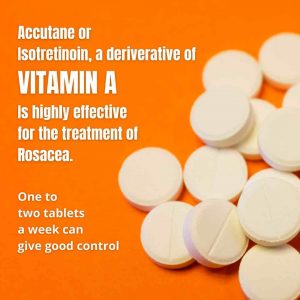
What are the side effects of isotretinoin?
Lots. Read the product information for an overview. In the context of rosacea, the dosing is much less compared to acne treatments. This tablet is teratogenic, meaning foetal malformation occurs if you fall pregnant on this medication. The washout period is one month. Ocular changes are important to note, especially if you suffer from dry eyes.
How to take Accutane / Oratane?
Your dermatologist will guide you through their preferred regime. For my patients, it goes something like this-
Take as directed. I have written the instructions on your prescription. This is the maximum dose by default. If you have good control, you can decrease frequency to find the minimum dose that gives you the best results. This will vary for everyone. If you have any side effects that you can not address, stop the medication.
*DIsclaimer: I would rather not prescribe you any tablets, that is why I am a procedural dermatologist. However the majority of rosacea patients I see are referred to me by other dermatologists because normal treatments do not work.
How long will you need to take Accutane / Oratane for?
It ranges from 6 weeks to 2 years. The dose varies from 10 mg isotretinoin per day, to 5 mg per week & everything in between. I do not like prescribing tablets, that is why my job involves lasers. The flipside is that the patients I typically treat fail to respond to skin care, fluffy natural remedies & the usual prescription medications.
What tablets can be used for flushing rosacea?
This form of rosacea is challenging to treat. It can occur in isolation, or frequently be seen with other causes of flushing. In younger patients it occurs with emotive- physiological flushing. In middle aged females with menopausal flushing. Tablets are used to stabilise blood vessels. They include beta-blockers such as propranolol as well as alpha agonists such as clonidine.
Disclaimer: For flushing & blushing, please see a medical dermatologist. Laser is not the first line treatment. Lasers are useful in cases of static redness, ruddy skin or broken capillaries.
How do I personally view tablets for rosacea?
If you are naturally inclined to avoid prescription medications, a dermatologist is the last specialist you see. My colleagues prescribe drugs as listed above. Hence you should try all the lifestyle changes, natural skin care, topicals, supplements & dietary restrictions before seeking advice.
I personally do not like to prescribe, hence why I am a procedural dermatologist. If I do prescribe, it is because I act in your best interest, as lasers are synergistic with certain anti-inflammatories & oral retinoids. 
What topical creams are frequently prescribed?
Prescription creams are used early in management of rosacea. You can obtain these from your family general practitioner. Creams are best used for mild papular-pustular rosacea. They do not treat broken capillaries, & are of limited value for background redness. Topicals include-
Rozex or metronidazole. This works as an anti-inflammatory medication. Apply nightly, you can increase to twice a day.
Finacea or Azelaic acid. This formulation can also be purchased over the counter- Azclear or Paula’s Choice. Use nightly, option for twice daily application.
Soolantra or ivermectin. This targets demodex mites found in higher numbers in rosacea patients.
Mirvaso or brimonidine. This can target redness & flushing. Rebound is frequent. It is difficult to apply correctly.
Sulphur based topicals include sodium sulfacetamide +/-salicylic acid. Used as a wash or leave on. Usually compounded OTC formulations in the US.
Retinoids can be useful. Very tricky to apply as they can easily flare up rosacea. Short contact application of retinol, tretinoin, & others advisable.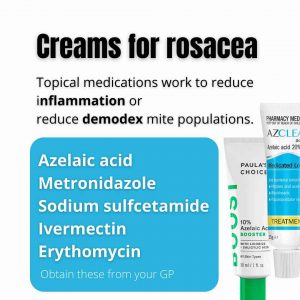
Disclaimer: I do not prescribe topicals as a stand alone treatment as my work is procedural. These formulations can be prescribed by your GP or a medical dermatologist.
What over the counter skin care options are there?
If you are not yet ready to take the step with medical management, a DIY skincare routine may help. A simple, yet cost effective rosacea regime is:
AM: Wash with La Roche Posay Rosaliac – tepid water. Apply Anthelios sunscreen
PM: Wash as above. Apply azelaic acid Monday to Friday nights, and niacinamide on weekends. You can supplement this regime with remedies below, additionally modifying lifestyle factors can be useful- see the section on rosacea tips.
What are natural remedies for rosacea?
You may want to try these out before seeking heavy duty prescription medications from a dermatologist. The majority of the listed ingredients can be sourced topically, some are in tablet form. Your local naturopath can guide you.
Niacinamide – nicotinamide or vitamin B3 is probably the best vitamin for rosacea patients. Best applied topically, can be taken as a tablet.
Aloe vera is the go-to plant for skin inflammation. It is tasty in a drink.
Camomile can be used as a drink (tea) or topically as compresses. Low chance of allergic contact dermatitis. Relaxing at best.
Green tea is a potent antioxidant with scientific data. Drink it, it’s good for you.
Other botanical extracts include raw honey, ginger, rosemary & thyme. Chuck them in your food, they do no harm.
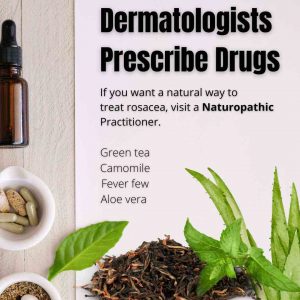
Disclaimer:I am all for natural remedies. If they work, it is one less person I need to prescribe medication for. In most cases, natural remedies work best with mainstream medicine.
What tablets are prescribed for steroid induced rosacea?
Frequently known as perioral dermatitis, steroids can cause & flare up rosacea. The antibiotics of choice include doxycycline, tetracycline, and azithromycin for erythromycin. Oral medications work much better than topicals. You need to be on it for 4-8 weeks.
Disclaimer: I do not treat perioral dermatitis. Please ask for a referral to my colleagues. My work is procedural.
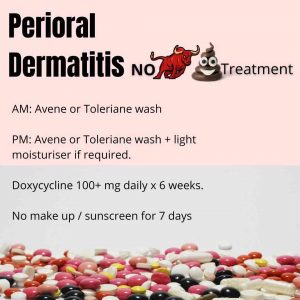
What tablets can help ocular rosacea?
Be guided by your ophthalmologist. Eye disease is seen in one quarter of rosacea patients. Simple baths, topicals & lubrication can help. Doxycycline can work as an anti-inflammatory, oral isotretinoin can go either way with rosacea. IPL or vascular lasers can help alleviate signs & symptoms of ocular rosacea.
What does a simple rosacea prescription look like?
Tying it all together, an average script looks something like this:
Wash AM: La Roche Posay Rosaliac wash, Invisible Zinc SPF
Tablets: Doxycycline 50 mg twice a day for 10 days, dropping down to once a day for 6- 10 weeks.
Wash PM: La Roche Posay Tolerane wash, niacinamide (or azelaic acid) cream.
The above is as simple as it gets. You can obtain prescriptions from your family physician. Note: I manage complex cases of rosacea, namely with laser therapy. For topicals & oral medication, please see a medical dermatologist.
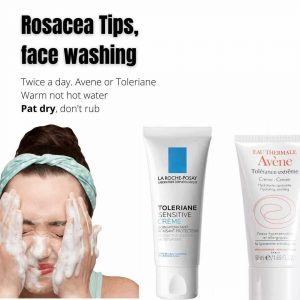

Davin’s viewpoint on tablets for rosacea
In the treatment ladder of rosacea, tablets are about midway. View prescription tablets as an option when the usual lifestyle changes, dietary changes, topicals, & skin care don’t control your rosacea. Anti-inflammatory tablets are useful as adjunctive treatments, usually in a cyclic manner.
I view rosacea as an adjustment disorder, namely it takes time for you to adjust to a chronic condition (much like lower back pain). Most people will take 3-5 years to understand their pattern. Everyone has a unique blueprint of exacerbating factors that includes stress, foods, heat, emotion, topical skin care, UV, climate changes, alcohol, & a whole lot more. The more analytical you are, the faster you can adjust. Keeping a simple rosacea diary can speed up the process.
Typically rosacea patients will have timely flares, most often in winter (cold, westerly winds) & seasonal change (UV, wind). This is when tablets, including oral antiinflammatories & isotretinoin can be useful. The aim of therapy, in my opinion, is to limit any oral medication to the minimum amount required to control rosacea- this includes dose & duration. Be guided by your dermatologist.
Disclaimer: My work is procedural, namely I specialise in laser management of rosacea. I do not practice medical dermatology (namely prescription medications), however I often initiate oral medications concurrently with laser treatments. This is due to the fact that my job is to get your rosacea under control in the fastest/safest way possible. The choice of tablets is yours.

